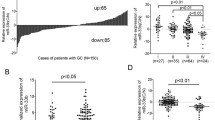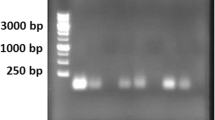Abstract
Background
Genetic and epigenetic changes have strong role in the development of gastric cancer. The mutation of the MIR129-2 gene is one of the major causes in many cancers, especially gastric cancer. The aim of this study was to investigate the methylation changes of the MIR129-2 gene in tumor and normal tissue of patients with gastric cancer.
Method
In this study, 50 gastric cancer patients with Iranian Azari ethnic origin without any familial relations were included. Genomic DNAs was extracted from the tumoral and normal tissues. Then the promotor regions of the MIR129-2 gene were analyzed by methylation-specific PCR (MSP) to evaluate the presence or absence of methylated CpG sites.
Results
There was a statistically significant difference in methylation level of MIR129-2 gene between tumoral and normal tissues. It was observed that 84 out of 100 CpG cites were methylated in tumoral tissues in compression to 13 out of 100 CpG cites in normal tissues.
Conclusion
MIR129-2 gene was hypermethylated in tumoral tissues, suggesting that methylation is involved in the development of gastric cancer.


Similar content being viewed by others
References
Sim, F. and M. McKee, Issues in public health. 2011: McGraw-Hill Education (UK).
Shomali N, Mansoori B, Mohammadi A, Shirafkan N, Ghasabi M, Baradaran B. MiR-146a functions as a small silent player in gastric cancer. Biomed Pharmacother. 2017;96:238–45.
Ruddon RW. Cancer biology: Oxford University Press; 2007.
Park JY, von Karsa L, Herrero R. Prevention strategies for gastric cancer: a global perspective. Clinical endoscopy. 2014;47(6):478.
Tomasetti C, Li L, Vogelstein B. Stem cell divisions, somatic mutations, cancer etiology, and cancer prevention. Science. 2017;355(6331):1330–4.
Devi, L.I., L. Ralte, and M.A. Ali, Serum biochemical profile of gastric cancer patients.
Ghavifekr Fakhr M, Rezaie Kahkhaie K, Shanehbandi D, Farshdousti Hagh M, Zarredar H, Safarzadeh E, et al. Scrophularia atropatana extract reverses tp53 gene promoter hypermethylation and decreases survivin antiapoptotic gene expression in breast cancer cells. Asian Pac J Cancer Prev. 2018;19(9):2599–605.
Pharoah PD, Guilford P, Caldas C. Incidence of gastric cancer and breast cancer in CDH1 (E-cadherin) mutation carriers from hereditary diffuse gastric cancer families. Gastroenterology. 2001;121(6):1348–53.
Hansford S, Kaurah P, Li-Chang H, Woo M, Senz J, Pinheiro H, et al. Hereditary diffuse gastric cancer syndrome: CDH1 mutations and beyond. JAMA Oncol. 2015;1(1):23–32.
Asadi M, Shanehbandi D, Mohammadpour H, Hashemzadeh S, Sepehri B. Expression level of miR-34a in tumor tissue from patients with esophageal squamous cell carcinoma. J Gastrointest Cancer. 2018.
Mayank, Jaitak V. Drug target strategies in breast cancer treatment: recent developments. Anti Cancer Agents Med Chem. 2014;14(10):1414–27.
Park HS, Jang MH, Kim EJ, Kim HJ, Lee HJ, Kim YJ, et al. High EGFR gene copy number predicts poor outcome in triple-negative breast cancer. Mod Pathol. 2014;27(9):1212–22.
Shirafkan N, Mansoori B, Mohammadi A, Shomali N, Ghasbi M, Baradaran B. MicroRNAs as novel biomarkers for colorectal cancer: new outlooks. Biomed Pharmacother. 2018;97:1319–30.
Bagaria SP, Ray PS, Sim MS, Ye X, Shamonki JM, Cui X, et al. Personalizing breast cancer staging by the inclusion of ER, PR, and HER2. JAMA Surg. 2014;149(2):125–9.
Calin GA, Sevignani C, Dumitru CD, Hyslop T, Noch E, Yendamuri S, et al. Human microRNA genes are frequently located at fragile sites and genomic regions involved in cancers. Proc Natl Acad Sci U S A. 2004;101(9):2999–3004.
Farazi TA, et al. MicroRNAs in human cancer. Adv Exp Med Biol. 2013;774:1–20.
Shrestha S, Hsu SD, Huang WY, Huang HY, Chen WL, Weng SL, et al. A systematic review of microRNA expression profiling studies in human gastric cancer. Cancer Med. 2014;3(4):878–88.
Lim LP, Lau NC, Weinstein EG, Abdelhakim A, Yekta S, Rhoades MW, et al. The microRNAs of Caenorhabditis elegans. Genes Dev. 2003;17(8):991–1008.
Shen R, Pan S, Qi S, Lin X, Cheng S. Epigenetic repression of microRNA-129-2 leads to overexpression of SOX4 in gastric cancer. Biochem Biophys Res Commun. 2010;394(4):1047–52.
Lee YY, Derakhshan MH. Environmental and lifestyle risk factors of gastric cancer. Arch Iran Med. 2013;16(6):358–65.
Tsai KW, Wu CW, Hu LY, Li SC, Liao YL, Lai CH, et al. Epigenetic regulation of miR-34b and miR-129 expression in gastric cancer. Int J Cancer. 2011;129(11):2600–10.
Katada T, Ishiguro H, Kuwabara Y, Kimura M, Mitui A, Mori Y, et al. microRNA expression profile in undifferentiated gastric cancer. Int J Oncol. 2009;34(2):537–42.
Bandres E, Agirre X, Bitarte N, Ramirez N, Zarate R, Roman-Gomez J, et al. Epigenetic regulation of microRNA expression in colorectal cancer. Int J Cancer. 2009;125(11):2737–43.
Liu Y, Hei Y, Shu Q, Dong J, Gao Y, Fu H, et al. VCP/p97, down-regulated by microRNA-129-5p, could regulate the progression of hepatocellular carcinoma. PLoS One. 2012;7(4):e35800.
Chen X, Zhang L, Zhang T, Hao M, Zhang X, Zhang J, et al. Methylation-mediated repression of microRNA 129-2 enhances oncogenic SOX4 expression in HCC. Liver Int. 2013;33(3):476–86.
Kang M, et al. miR-129-2 suppresses proliferation and migration of esophageal carcinoma cells through downregulation of SOX4 expression. Int J Mol Med. 2013;32(1):51–8.
Funding
This project was supported by a grant from research committee of Tabriz Medical University, Tabriz, Iran.
Author information
Authors and Affiliations
Corresponding author
Ethics declarations
Ethics Approval and Consent to Participate
Informed consent was obtained from each patient and the ethical approaches were approved by the ethic committee of Tabriz University of Medical Sciences.
Conflict of Interest
The authors declare that they have no conflict of interests.
Additional information
Publisher’s Note
Springer Nature remains neutral with regard to jurisdictional claims in published maps and institutional affiliations.
Rights and permissions
About this article
Cite this article
Alizadeh, N., Asadi, M., Shanehbandi, D. et al. Evaluation of the Methylation of MIR129-2 Gene in Gastric Cancer. J Gastrointest Canc 51, 267–270 (2020). https://doi.org/10.1007/s12029-019-00239-4
Published:
Issue Date:
DOI: https://doi.org/10.1007/s12029-019-00239-4




